-
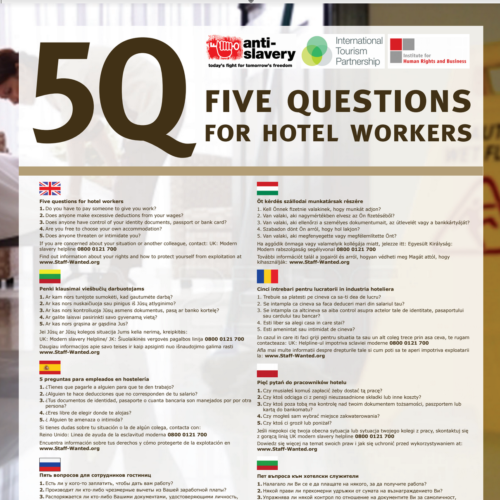 The Staff Wanted Initiative is a collaborative effort from Anti-Slavery International, the UK's only charity dedicated solely to ending modern slavery, and the IHRB, a leading international think tank on business and human rights. The Initiative works to expose and end exploitation of workers in UK hotels. This poster is part of their awareness-raising initiative within the hotel.
The Staff Wanted Initiative is a collaborative effort from Anti-Slavery International, the UK's only charity dedicated solely to ending modern slavery, and the IHRB, a leading international think tank on business and human rights. The Initiative works to expose and end exploitation of workers in UK hotels. This poster is part of their awareness-raising initiative within the hotel. -
 Stronger Together is a multi-stakeholder initiative which aims to reduce modern slavery. It provides guidance, training and resources to organisations, employers, labour providers, workers and their representatives. This free collection of resources includes pragmatic guidance and toolkits, and resources for the workplace including multilingual posters, leaflets and template policies. This template is to be modified as required and for inclusion with a wider Tackling Modern Slavery in Business and Supply Chain or Business Human Rights Policy.
Stronger Together is a multi-stakeholder initiative which aims to reduce modern slavery. It provides guidance, training and resources to organisations, employers, labour providers, workers and their representatives. This free collection of resources includes pragmatic guidance and toolkits, and resources for the workplace including multilingual posters, leaflets and template policies. This template is to be modified as required and for inclusion with a wider Tackling Modern Slavery in Business and Supply Chain or Business Human Rights Policy.Credit: Stronger Together
-
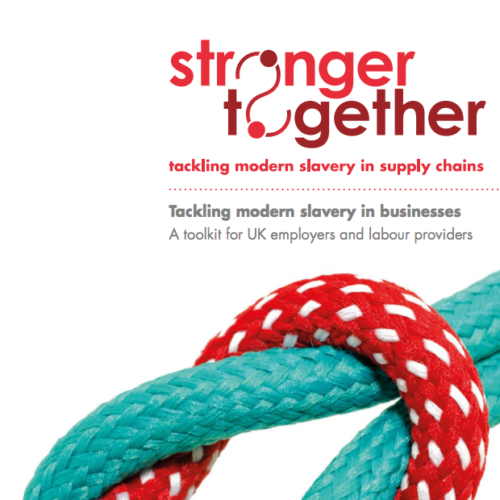 Stronger Together is a multi-stakeholder initiative which aims to reduce modern slavery. It provides guidance, training and resources to organisations, employers, labour providers, workers and their representatives. This free collection of resources includes pragmatic guidance and toolkits, and resources for the workplace including multilingual posters, leaflets and template policies. This template is to be modified as required and for inclusion with a wider Tackling Modern Slavery in Business and Supply Chain or Business Human Rights Policy.
Stronger Together is a multi-stakeholder initiative which aims to reduce modern slavery. It provides guidance, training and resources to organisations, employers, labour providers, workers and their representatives. This free collection of resources includes pragmatic guidance and toolkits, and resources for the workplace including multilingual posters, leaflets and template policies. This template is to be modified as required and for inclusion with a wider Tackling Modern Slavery in Business and Supply Chain or Business Human Rights Policy.Credit: Stronger Together
-
 Stronger Together is a multi-stakeholder initiative which aims to reduce modern slavery. It provides guidance, training and resources to organisations, employers, labour providers, workers and their representatives. This free collection of resources includes pragmatic guidance and toolkits, and resources for the workplace including multilingual posters, leaflets and template policies. This template is to be modified as required and for inclusion with a wider Tackling Modern Slavery in Business and Supply Chain or Business Human Rights Policy.
Stronger Together is a multi-stakeholder initiative which aims to reduce modern slavery. It provides guidance, training and resources to organisations, employers, labour providers, workers and their representatives. This free collection of resources includes pragmatic guidance and toolkits, and resources for the workplace including multilingual posters, leaflets and template policies. This template is to be modified as required and for inclusion with a wider Tackling Modern Slavery in Business and Supply Chain or Business Human Rights Policy.Credit: Stronger Together
-
 Stronger Together is a multi-stakeholder initiative which aims to reduce modern slavery. It provides guidance, training and resources to organisations, employers, labour providers, workers and their representatives. This free collection of resources includes pragmatic guidance and toolkits, and resources for the workplace including multilingual posters, leaflets and template policies. This template is to be modified as required and for inclusion with a wider Tackling Modern Slavery in Business and Supply Chain or Business Human Rights Policy.
Stronger Together is a multi-stakeholder initiative which aims to reduce modern slavery. It provides guidance, training and resources to organisations, employers, labour providers, workers and their representatives. This free collection of resources includes pragmatic guidance and toolkits, and resources for the workplace including multilingual posters, leaflets and template policies. This template is to be modified as required and for inclusion with a wider Tackling Modern Slavery in Business and Supply Chain or Business Human Rights Policy.Credit: Stronger Together
-
 Stronger Together is a multi-stakeholder initiative which aims to reduce modern slavery. It provides guidance, training and resources to organisations, employers, labour providers, workers and their representatives. This free collection of resources includes pragmatic guidance and toolkits, and resources for the workplace including multilingual posters, leaflets and template policies. This template is to be modified as required and for inclusion with a wider Tackling Modern Slavery in Business and Supply Chain or Business Human Rights Policy.
Stronger Together is a multi-stakeholder initiative which aims to reduce modern slavery. It provides guidance, training and resources to organisations, employers, labour providers, workers and their representatives. This free collection of resources includes pragmatic guidance and toolkits, and resources for the workplace including multilingual posters, leaflets and template policies. This template is to be modified as required and for inclusion with a wider Tackling Modern Slavery in Business and Supply Chain or Business Human Rights Policy.Credit: Stronger Together
-
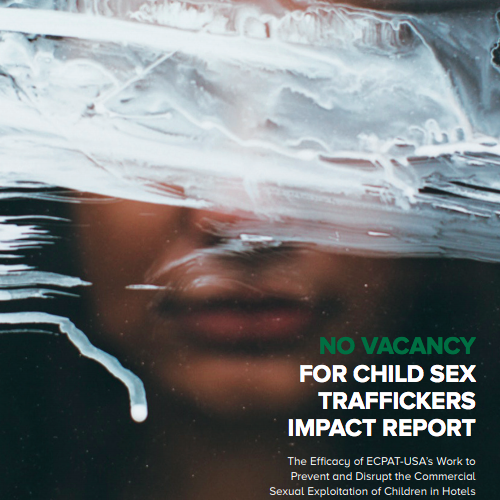 The report, "No Vacancy for Child Sex Traffickers Report: The Efficacy of ECPAT-USA’s Work to Prevent and Disrupt the Commercial Sexual Exploitation of Children in Hotels", highlights the efforts of ECPAT-USA in engaging the US travel and tourism industry in protecting children from sex trafficking and exploitation.
The report, "No Vacancy for Child Sex Traffickers Report: The Efficacy of ECPAT-USA’s Work to Prevent and Disrupt the Commercial Sexual Exploitation of Children in Hotels", highlights the efforts of ECPAT-USA in engaging the US travel and tourism industry in protecting children from sex trafficking and exploitation.Credit: ECPAT-USA
-
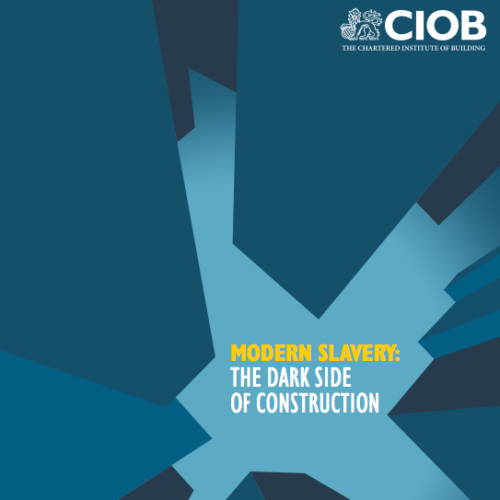 The Chartered Institute of Building published this report to shed light on exploitation within the construction industry. The report looks at labour exploitation all over the world considering the different types of exploitation in the industry, and offering recommendations to develop effective frameworks that will help protect human rights in the industry.
The Chartered Institute of Building published this report to shed light on exploitation within the construction industry. The report looks at labour exploitation all over the world considering the different types of exploitation in the industry, and offering recommendations to develop effective frameworks that will help protect human rights in the industry.Credit: Chartered Institute of Building (CIOB)
-
 This is an analysis of modern slavery statements that focuses on changes in reporting and practice in addressing forced labour and human trafficking. It covers 150 sample companies across different sectors. It seeks to understand the quality and scope of reporting against the UK Modern Slavery Act’s transparency requirements set out in s. 54 as well as the accompanying guidance on recommended content published by the Home Office.
This is an analysis of modern slavery statements that focuses on changes in reporting and practice in addressing forced labour and human trafficking. It covers 150 sample companies across different sectors. It seeks to understand the quality and scope of reporting against the UK Modern Slavery Act’s transparency requirements set out in s. 54 as well as the accompanying guidance on recommended content published by the Home Office.Credit: Ergon Associates
-
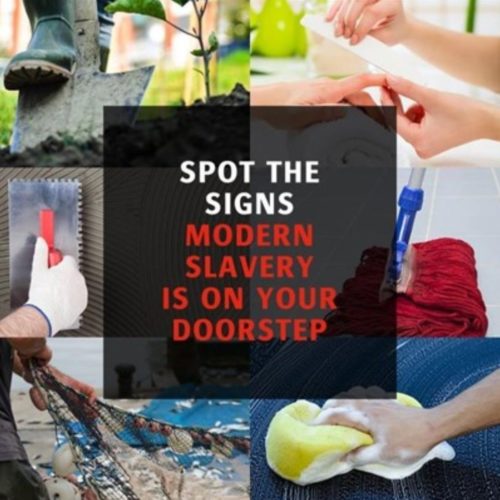 Crimestoppers is an independent charity helping law enforcement to locate criminals and help solve crimes. They have an anonymous 24/7 phone number (0800 555 111) that people can call to pass on information about crime. They are running a campaign to help people identify the signs of modern slavery and give specific information about the hospitality sector. The flyer about spotting the signs is in six languages.
Crimestoppers is an independent charity helping law enforcement to locate criminals and help solve crimes. They have an anonymous 24/7 phone number (0800 555 111) that people can call to pass on information about crime. They are running a campaign to help people identify the signs of modern slavery and give specific information about the hospitality sector. The flyer about spotting the signs is in six languages.Credit: Crimestoppers
-
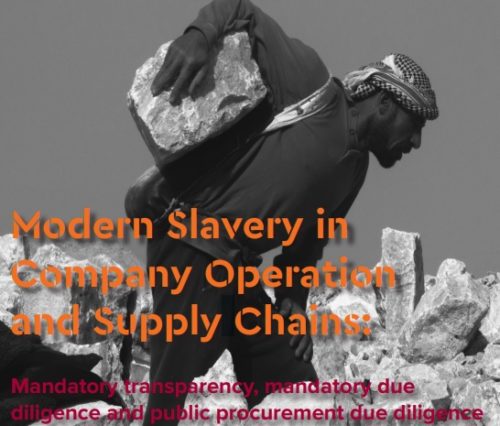 This paper sets out what leading governments are already doing to insist global business does more to eradicate modern slavery. It draws from this experience to set out how these uncoordinated actions could become a robust, and harmonised international standard for national legislation.
This paper sets out what leading governments are already doing to insist global business does more to eradicate modern slavery. It draws from this experience to set out how these uncoordinated actions could become a robust, and harmonised international standard for national legislation.Credit: ITUC and Business and Human Rights Resource Centre
-
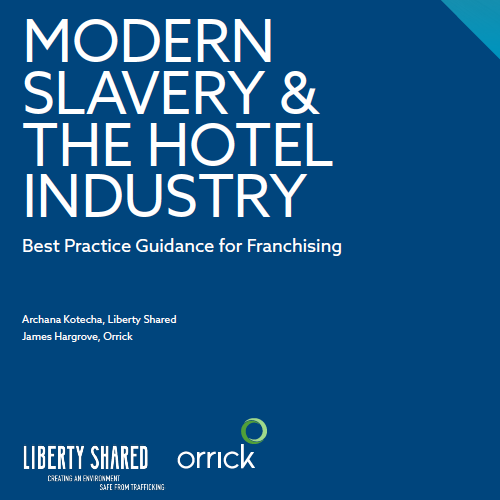 This guide, drafted by Liberty Shared, recognises the risks the hotel industry, and in particular hotels operating under major international brand franchises, face in regards to human rights abuses. This guide provides franchisors with an overview of the risks associated with modern slavery in relation to hotel franchise agreements and sets out practical solutions aimed at increasing the prospect that a franchisee's operations are free from these risks. Liberty Shared aims to prevent human trafficking through legal advocacy, technological interventions, and strategic collaborations with NGOs and corporations in Asia and globally.
This guide, drafted by Liberty Shared, recognises the risks the hotel industry, and in particular hotels operating under major international brand franchises, face in regards to human rights abuses. This guide provides franchisors with an overview of the risks associated with modern slavery in relation to hotel franchise agreements and sets out practical solutions aimed at increasing the prospect that a franchisee's operations are free from these risks. Liberty Shared aims to prevent human trafficking through legal advocacy, technological interventions, and strategic collaborations with NGOs and corporations in Asia and globally.Credit: Liberty Shared
-
 Stronger Together is a multi-stakeholder initiative which aims to reduce modern slavery. It provides guidance, training and resources to organisations, employers, labour providers, workers and their representatives. This free collection of resources includes pragmatic guidance and toolkits, and resources for the workplace including multilingual posters, leaflets and template policies. These seven principles have been agreed upon by the supermarket businesses sponsored by Stronger Together. The list includes "common principles" for the businesses' supply chains partners to follow when completing modern slavery statements.
Stronger Together is a multi-stakeholder initiative which aims to reduce modern slavery. It provides guidance, training and resources to organisations, employers, labour providers, workers and their representatives. This free collection of resources includes pragmatic guidance and toolkits, and resources for the workplace including multilingual posters, leaflets and template policies. These seven principles have been agreed upon by the supermarket businesses sponsored by Stronger Together. The list includes "common principles" for the businesses' supply chains partners to follow when completing modern slavery statements.Credit: Stronger Together
-
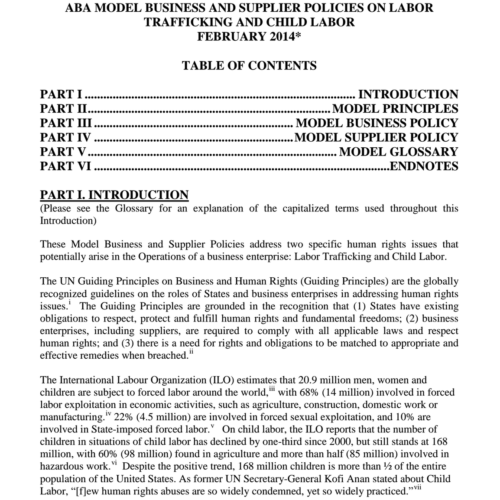 These model principles are intended for both businesses and suppliers that do not currently have policies relating to labour trafficking and child labour, and for those that do but want to adapt them to reflect evolving practices. Included are examples of model policies and principles that can be incoporated into codes of conduct or current business policies.
These model principles are intended for both businesses and suppliers that do not currently have policies relating to labour trafficking and child labour, and for those that do but want to adapt them to reflect evolving practices. Included are examples of model policies and principles that can be incoporated into codes of conduct or current business policies.Credit: American Bar Association
-
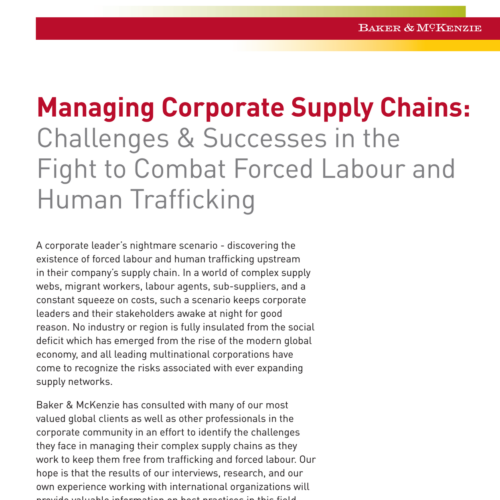 This guide is published by a law firm with expertise providing modern slavery related advice to business. It gives a good overview of the scope of the problem of trafficking in supply chains, and what existing support there is for business. It looks at the legal mechanisms already in place to protect against modern slavery in corporate supply chains, as well as the successes and challenges of corporate initiatives, and solutions to the problem.
This guide is published by a law firm with expertise providing modern slavery related advice to business. It gives a good overview of the scope of the problem of trafficking in supply chains, and what existing support there is for business. It looks at the legal mechanisms already in place to protect against modern slavery in corporate supply chains, as well as the successes and challenges of corporate initiatives, and solutions to the problem.Credit: Baker McKenzie
-
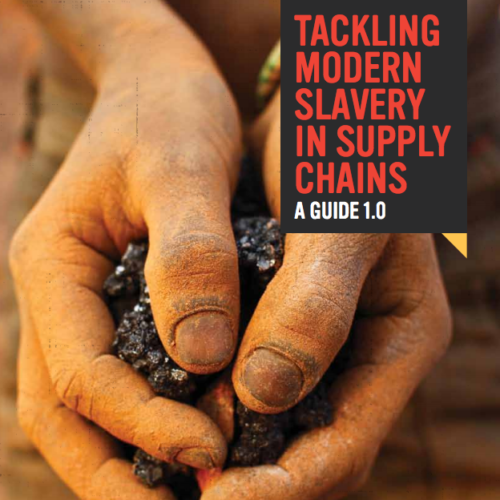 The Walk Free Foundation was established by Andrew Forrest, the Chairman of Fortescue Metals Group, after he found labour exploitation within his own supply chains and took a number of steps to prevent modern slavery affecting his business. This comprehensive guide considers corporate policy on modern slavery and provides both guidance and tools to implement it. It includes advice on corporate policy and provides template examples of a number of tools.
The Walk Free Foundation was established by Andrew Forrest, the Chairman of Fortescue Metals Group, after he found labour exploitation within his own supply chains and took a number of steps to prevent modern slavery affecting his business. This comprehensive guide considers corporate policy on modern slavery and provides both guidance and tools to implement it. It includes advice on corporate policy and provides template examples of a number of tools.Credit: Walk Free Foundation & Verite

